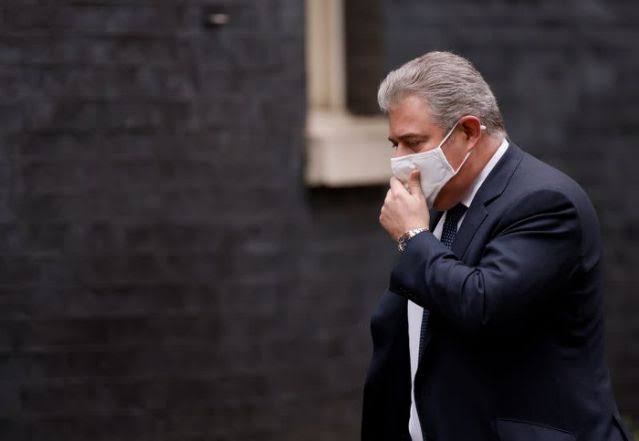Britain says unionist anger over Brexit deal could put Northern Ireland ‘in quite a dangerous place’
London (Reuters) – Britain said on Friday that anger in Northern Ireland’s unionist community over the Brexit divorce deal was serious and cautioned the European Union that such tensions could ultimately undermine stability unless properly addressed.
Northern Ireland has always been the toughest issue in the Brexit divorce and just a month after the United Kingdom exited the EU, the European Commission briefly threatened to impose emergency controls on vaccines crossing the Irish land border.
Though the EU swiftly stepped back from that, tensions have been rising in Northern Ireland, a British province.
Britain last month unilaterally extended a grace period for checks on food going from Britain to Northern Ireland – which effectively stayed in the EU’s single market and customs union under the divorce deal to avoid a hard border with Ireland.
The EU has started legal action over Britain’s move.
A senior pro-British loyalist said on Friday that Northern Ireland’s 1998 peace agreement is under threat and a “Pandora’s box” of protest and political crisis will be opened unless the EU agrees to significant changes to the Brexit deal.
The peace accord, known as the Belfast or Good Friday Agreement, ended three decades of violence between mostly Catholic nationalists fighting for a united Ireland and mostly Protestant unionists, or loyalists, who want Northern Ireland to remain an integral part of the United Kingdom.
The deal guaranteed an open Irish land border to help safeguard peace, free trade and travel on the island.
“If the unionist community feel that the Protocol is breaching the Good Friday agreement and moving away from the spirit of it, then we’re in quite a dangerous place in terms of stability of not just the executive but the north-south institutions,” British Northern Ireland Secretary Brandon Lewis told reporters.
Loyalist paramilitary groups told British Prime Minister Boris Johnson earlier this month that they were temporarily withdrawing support for the peace agreement due to concerns over the Brexit deal.
Lewis mentioned that warning.
“I don’t agree with that, I think it would be a mistake, but it does underline the sense of tension … We have to recognise there is that tension there,” he said.
Lewis said Britain had to take unilateral action to extend grace periods, otherwise shops would have run out of goods in Northern Ireland.
“If we hadn’t, if we’d have had another set of empty shelves this week … the fallout from that in the unionist community means the Protocol would, I think, have been fatally flawed.”
Irish nationalists Sinn Fein accused Lewis of hypocrisy and said his comments demonstrated a failure of the “rigorous impartiality” required by the Good Friday Agreement.
“This is the same British government who have signed up to the Protocol with the EU and have committed to its implementation,” Sinn Fein Member of Parliament Chris Hazzard said in a statement.
The European Commission briefly threatened in January to impose emergency controls on vaccines crossing the open Ireland-Northern Ireland border, a step that Lewis said had ratcheted up tensions in the unionist community.
“We’re still dealing with the fallout from that.”


